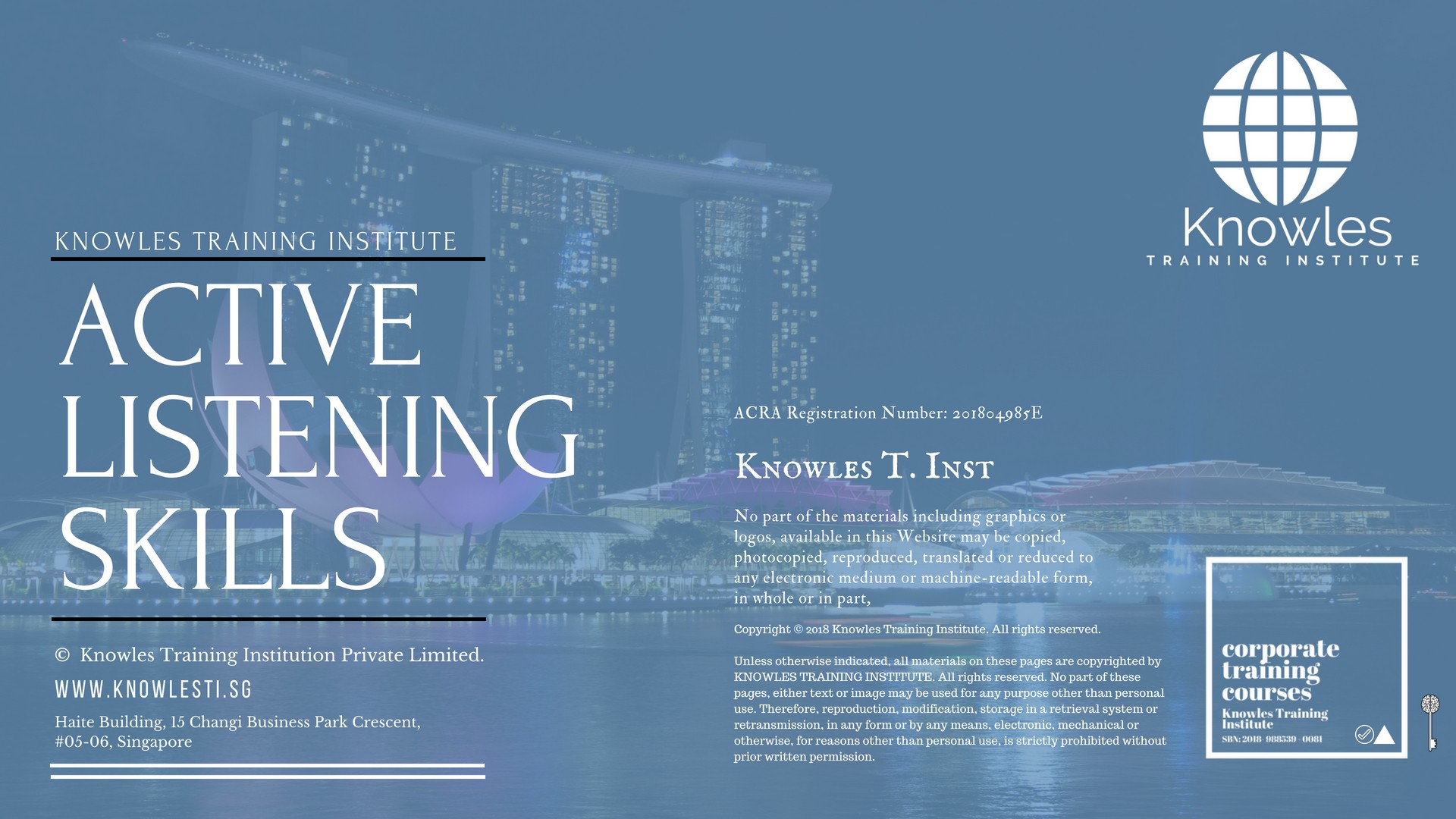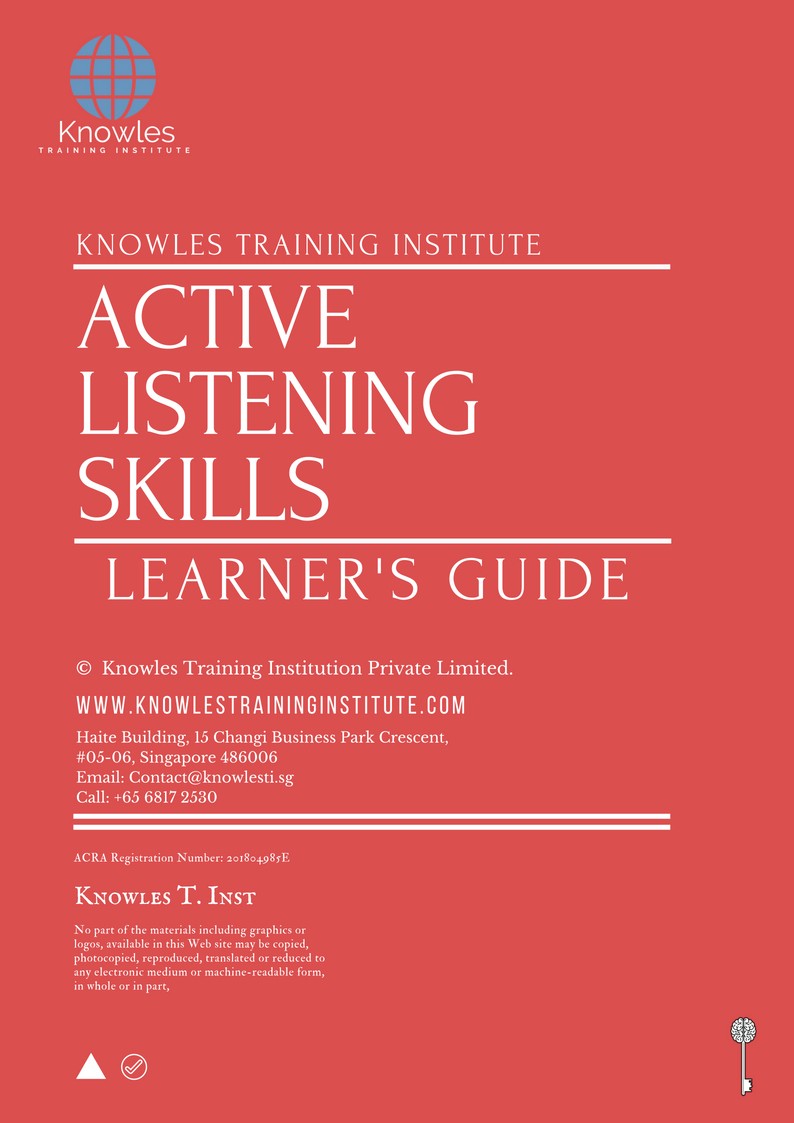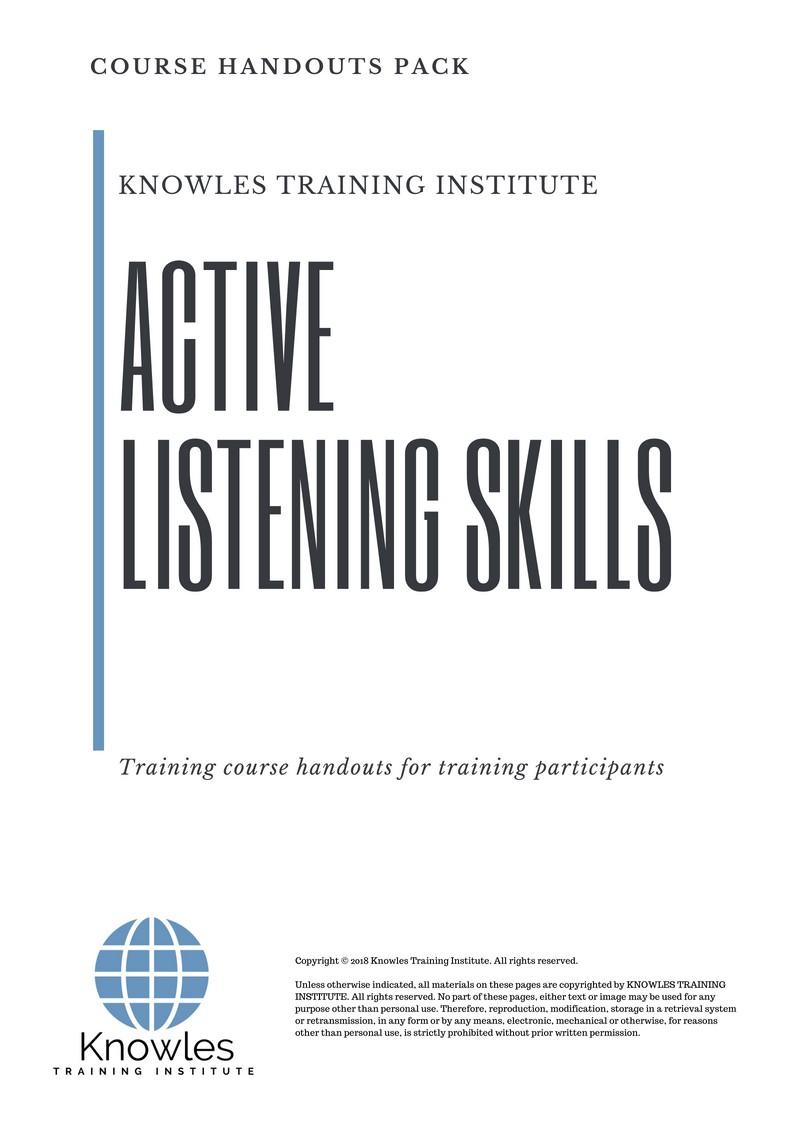Active Listening Training Course in Laos
Our corporate training course is also available in Vientiane, Pakse, Savannakhet, Luang Prabang, Thakhek, Xam Neua, Phonsavan, Pakxan, Muang Xay (Oudomxay), Saravan, Attapeu, Ban Houayxay, Phonsavanh, Muang Phonsavan, Muang Xai, Vang Vieng, Luang Namtha, Xaignabouli, Luang Nam Tha, Muang Khammouan, Pakxe, Savanakhet, Don Det and Don Khon, Nong Khiaw, and Champasak.

About This Active Listening Training Course in Laos
Active Listening Course in Laos
More than just hearing and nodding, active listening is an important skill that engages the whole body. It keeps the mind active in the sense that information is being dissected and filtered out while listening. Active listening not only benefits the listener but, through body language, the speaker is encouraged to speak as well.
Who Should Attend This Active Listening Course in Laos Workshop
This Active Listening Skills in Laos workshop is ideal for anyone who would like to gain a strong grasp and improve their Active Listening Skills.
All Staff Within An Organisation
Managers
Team Leaders
Executives
Assistants
Officers
Secretaries
Group Size For This Active Listening Skills Training Program in Laos
The ideal group size for this Active Listening Skills course in Laos is:
Minimum: 5 Participants
Maximum: 15 Participants
Course Duration For This Active Listening Training Course in Laos
The duration of this Active Listening Skills course in Laos workshop is 1 full day.
1 Full Day
9 a.m to 5 p.m
Active Listening Course in Laos Benefits
Below is the list of course benefits of our Active Listening Skills course in Laos
- Complete attention upgrades your capacity to grasp and pass on the information.
- Listening mindfully motivates individual to open up in front of you comfortably.
- Active listening composes relational attachments.
- Enables a better-built perception of the speaker
- Undivided attention encourages the person to remain real on the talk and helps to keep data what the individual understands.
- Provide an opportunity to settle down the controversy. It is hard to continue hitting when the other party does not hit back.
- Undivided attention allows the speaker to absolute sentiments.
- Active listening will give you extra data.
Active Listening Course in Laos Objectives
Below is the list of course objectives of our Active Listening Skills course in Laos
Module One: Course Overview
Module Two: Defining Active Listening
Module Four: Attitude is Everything!
Module Five: Encouraging Conversation
Module Six: Building Relationships
Module Seven: Getting Over Listening Roadblocks
Course Content For This Active Listening Skills Training Course in Laos
Below is the list of course content of our Active Listening Skills training course in Laos
Active Listening Course in Laos: Course Overview
Active Listening Course in Laos: Defining Active Listening
- What is Active Listening?
- Identifying Good Listeners
- Tips for Becoming a Better Listener
- Pre-Assignment Review
Active Listening Course in Laos: Body Language Basics
Active Listening Course in Laos: Attitude is Everything!
- Understanding Sympathy and Empathy
- Creating the Right Mindset
- Being Genuine
- Making Connections
Active Listening Course in Laos: Encouraging Conversation
- What Is Said and What Is Heard
- Asking Questions
- Probing Techniques
- Paraphrasing Techniques
Active Listening Course in Laos: Building Relationships
- Building Common Ground
- NLP Tips and Tricks
Active Listening Course in Laos: Getting Over Listening Roadblocks
- Recommended Reading List
- Post-Course Assessment
- Pre- and Post-Assessment Answer Keys
- Personal Action Plan
Active Listening Course in Laos Value Added Materials
Each participant will receive the following materials for the Active Listening Skills course in Laos
Active Listening Skills Course in Laos Learner’s Guide

Active Listening Skills Course in Laos Handouts

Active Listening Skills Course in Laos PPT Slides Used During Course

Active Listening Course in Laos Certification
Each course participant will receive a certification of training completion

Course Fees For Active Listening Skills Course in Laos
There are 4 pricing options available for this Active Listening Skills training course in Laos. Course participants not in Laos may choose to sign up for our online Active Listening Skills training course.
- USD 679.97 For a 60-minute Lunch Talk Session.
- USD 259.97 For a Half Day Course Per Participant.
- USD 419.97 For a 1 Day Course Per Participant.
- USD 569.97 For a 2 Day Course Per Participant.
Discounts available for more than 2 participants.
Upcoming Active Listening Skills Training Course in Laos Schedule
Contact us for the latest Active Listening Skills course in Laos schedules:
Email: contact@knowlesti.la
Message:
Download Active Listening Skills Course in Laos Brochure

Request for this Active Listening Skills course in Laos brochure. Fill up the short information below and we will send it to you right away!
Post Training Support: A vast majority of training does not have any effect beyond 120 days. To work, training has to have a strong pre- and post-training component. Post-training reinforcement helps individuals to recall the understanding and ask questions.
Blended Learning: Learning does not occur in the classroom. Virtually everybody prefers distinct ways of learning. Successful learning should have a multi-channel, multi-modal strategy.
- We Understand The Industry: We’ve got a profound comprehension of the business, business design, challenges, strategy and the that our participants are in and have designed the courseware to cater to their professional needs.
- Course Content: Knowles Training Institute’s material is relevant, of high quality and provide specific learning results. Participants will leave the training course feeling as they have gained a strong understanding and will also be in a position to execute what they have learned sensibly.
Course Development — The workshop modules follow a systematic and logical arrangement. This structure helps to ensure that the course material allows the facilitators to deliver the course in a logical arrangement. Consider the subjects as building bricks into learning, our facilitators slowly build towards a comprehensive picture of this entire topic.


Course Enquiries

Fill up the form and we will get back to you in less than 1 working day.
Alternatively, give us a call to have one of our training consultants contact you. Our corporate training courses can be contextualized to meet your organization’s training needs. Leverage on our large pool of professional trainers and consultants for your organization’s training needs.
Email: contact@knowlesti.la
We Guarantee 100% Privacy. We Respect Your Privacy. Your Information Will Never Be Shared.


